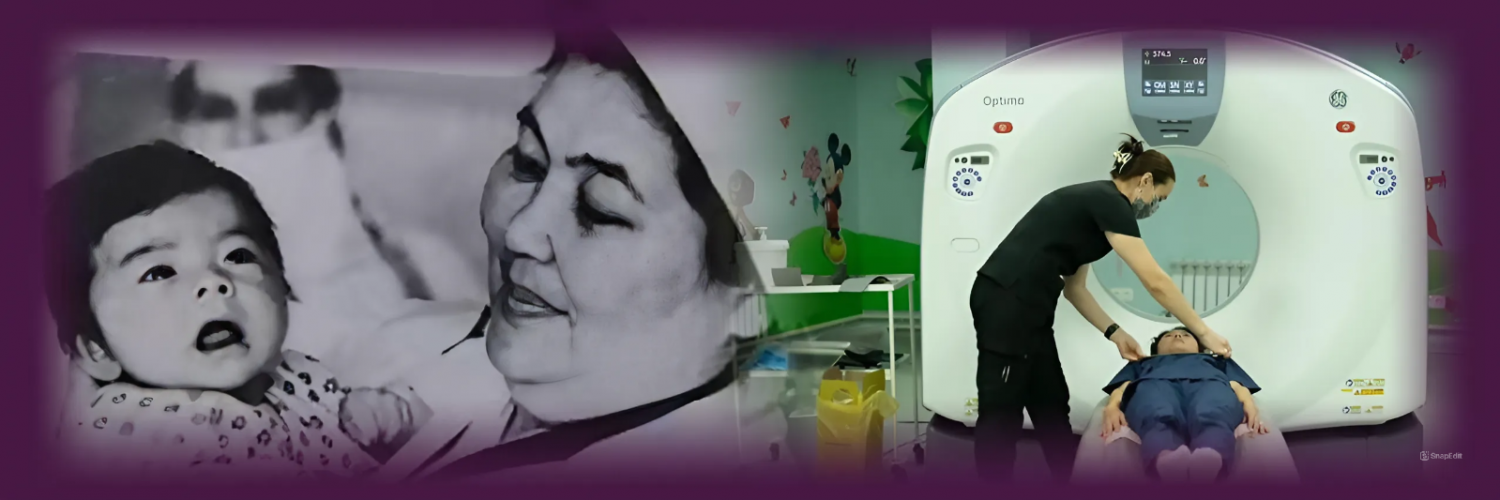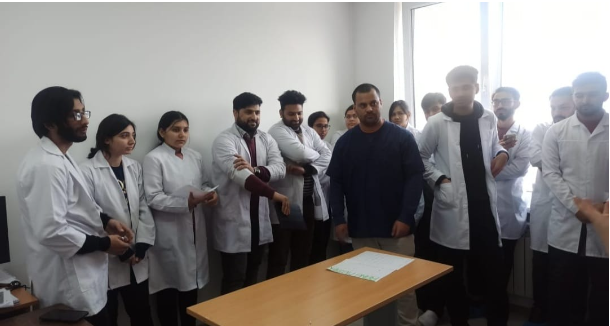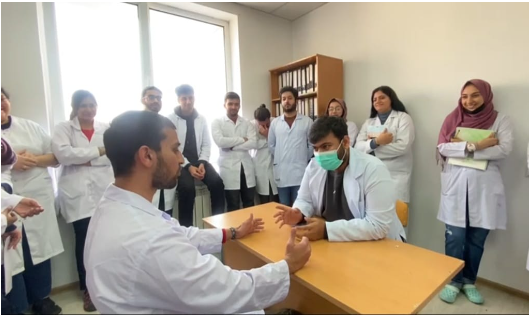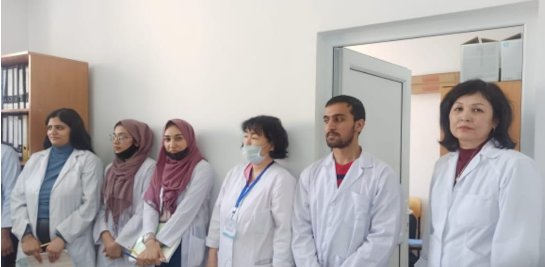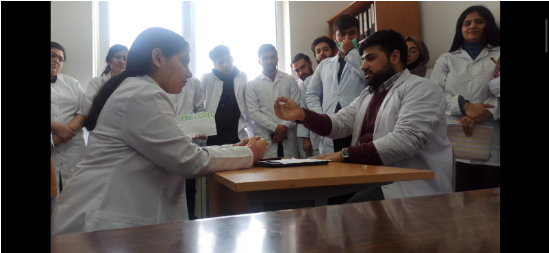Educational work is part of the educational process of the University and the department as a whole, in particular, aimed at implementing the tasks of forming and developing a personal culture of future medical professionals. The main tasks of educational work are to form students ‘ attitude to learning as a professional activity and belonging to a socio-professional group – the sphere of healthcare. Comprehensive development of human and professional qualities of future specialists, constant stimulation of possible creative activities for students, interest in their profession, independence in mastering the theoretical and practical foundations of the chosen profession. Types of educational work carried out at the Department: collective and individual events with students organized and conducted by curators of study groups and teachers of the department at the Faculty of Pediatrics, as well as the participation of students in all events held by Kaznmu. Asfendiyarov on different scales. The department annually draws up a plan of educational work. Curators of the Department actively organize various events with supervised groups from among the teachers. All plans have been agreed and approved, and their implementation is monitored by senior methodologists of the Department of Social Affairs and educational work of the school of Pediatrics. The plan of social and educational work of the department for 2021-2022. Directions in which educational work is carried out: Development of student self-government; Development of the volunteer movement; Patriotic education; Spiritual and moral education; Cultural and mass work; Formation of motivation for a healthy lifestyle: activities aimed at promoting a healthy lifestyle; promotion of physical education and sports; prevention of addictions (drug addiction, alcoholism, tobacco smoking); Prevention of offenses among young people; Prevention of interethnic and interfaith conflicts. According to the plan of educational work, the following activities were carried out by the staff of the department: 1. Anti-corruption measures “Corruption zhol zhok” 2. Conducting conversations on the prevention of coronavirus infection in an epidemiological situation, as well as on the promotion of healthy lifestyle 3. Events dedicated to the 30th anniversary of Independence of the Republic of Kazakhstan. 1) Curatorial hour “Tauelsizdikke 30 zhyl”, Acc. Bekenova A.E. with 4th year students of the OM group OM 18-015-01k, 01.12.2021 2) Curatorial hour “Tauelsizdikke 30 zhyl”, Ass. Adilbekova I.M. with students of the 4th year of the pedagogical group P 18 001-2k. 26.11.2021 3) Educational hour “Tauelsizdik tugyrym”, Associate Professor Azhakhmetova M.Z. with 4th year students of the OM group OM 18-006-01k, 11/26/2021 4) the Organization of the excursion in Central Museum of the city of Almaty, the exhibition “Tauelsizdik try” dedicated to 30 anniversary of independence of Kazakhstan, the Assistant esenova S. A., a 4th year students of pediatric faculty group P 18 005-1K, 14.12.2021 G. 4. According to the order of the Chairman of the Board-Rector No. 650 from 15 Dec 2021 carried out internal audit of the management system of counteraction of corruption at the 2021/2022 academic year. (Internal audit on 12/28/2021). 5. Participation in a training seminar on the topic: “Coronavirus in children: features of the course, symptoms, treatment and prevention”, Assistants Tazhieva K.N., Esenova S.A., February 24, 2022.
Educational work at the Department of Pediatric Diseases named after Prof. N.A.Barlybayeva on the topic: «The role of father and mother in the upbringing of a child»
According to the letter of the Committee of Postgraduate Education of the Ministry of Science and Higher Education of the Republic of Kazakhstan dated 02.02.2023 No.123-K on family values, spiritual morality, protection of marriage, being a mother, being a father, childhood and domestic violence, educational work with controversial technology was carried out at the Department of Pediatric Diseases named after prof N.A.Barlybayeva on 06.02.2023.
Students of the 4th course in the specialty «General Medicine» in the module «Basic of Children’s diseases» in the discipline «Children’s diseases» of the group GM-19-51a, GM-19-52a on the topic: «Being Mother» and «Being Father» using a business game and debatable technology, event organizers assistants Department of Children’s Diseases named after Prof. N.A.Barlybayeva, Masters of Medical Sciences Sagimova Raikhan Shyrynbayevna, Manasbayeva Araily Yelubayevna.
Leading the discussion were students GM-19-52a Nadra Hyder Shah Saqib Mir, speakers Singh Priyanka, Rizwan Wani Mohammad.
The leader of the GM-19-51a group, Hassan Javed, informed the importance of the role of the father in the family. This group of students chose the topic: «Being Father». The role-playing game was performed by students Zeeshan Ahid, Arslan Zafar.
The topic: «Being Mother» was revealed by students of the GM-19-52a group.
In general, students through role-playing games understood the importance of the role of mother and father in the family in the upbringing of a child.
Educational work at the Department of Pediatric Diseases after named Prof. N. A. Barlybayeva students conference on the topic: “Interethnic tolerance” and “Development of trilingualism“
According to the plan of the Department of Children’s Diseases named after prof. N. A. Barlybayeva on 04/03/2024 work was carried out on the topic: “Interethnic tolerance” and “Development of trilingualism” with students of the 4th year in the specialty General Medicine, module Basics of Children’s diseases, GM-20-94a, GM-20-95a, GM-20-73a, GM-20-74a groups student’s using a debatable technology. The educational work event was organized by Masters of Medical Sciences, assistants of the Department of Children’s diseases Sagimova Raikhan Shyrynbayeva, Manasbayeva Araily Yelubaevna, at the clinical base of the Children clinical city hospital No. 2.
Presentations were prepared by students of the GM-20-95a, GM-20-94a, GM-20-73a Payal Aggarwal., Zarmeen Farugui, Amal Qaisar Saleh, Fathima Henna, Jasna, Sumal Iqbal groups.
After the presentation, a discussion was held in the form of questions and answers. According to the educational activity, the conclusion was made by the assistants of the department Sagimova Raikhan Shyrynbayevna and Manasbayeva Araily Yelubayevna.
As a result, the students appreciated the advantages of 3 languages and the importance of interethnic tolerance in modern society.
On April 20, 2024, April 20,from 10.00 to 12.00 at KazNMU named after S.D. Asfendiyarov, within the framework of the Republican environmental action “Taza Kazakhstan”, a University-wide cleanup was held under the motto “We are for a clean city.”Оur assistants from the Department of Childhood Diseases named after N.A. Barlybaeva and their supervisory groups took part in the City Cleanup.
Curators: assistants Onalbaeva B.Zh. and Bekenov A.E.
Event dedicated to the 35th anniversary of the Convention on the Rights of the Child and 30th anniversary of its ratification by the Republic of Kazakhstan.
Lecture on the topic: «Мектеп жасындағы балаларды вакцинациялау».
In order to implement the UNICEF program “Universal Progressive Model of Foster Care Services for Pregnant Women and Premature Children” on April 29, 2024 at school-gymnasium No. 159 named after. Y. Altynsarin assistant of the Department of Children’s Diseases named after. Prof. N.A. Barlybaeva Kemer G.K. was held conversation with parents “Why is vaccination important?”. It noted the importance of vaccination for children. The lecture was attended by the class teacher and parents of 1st grade.
Assistant of the Department Kemer G.K. gave a lecture on the topic: «Мектеп жасындағы балаларды вакцинациялау». Considering the unstable situation regarding the incidence of measles and whooping cough, parents were given explanations about the importance of preventing infectious diseases. Galiya Kanatovna also noted that without vaccination we are at risk of serious diseases such as measles, meningitis, pneumonia, tetanus and polio. Many of these diseases are life-threatening. The World Health Organization estimates that childhood vaccines save more than 4 million lives every year. Information is given about complications after vaccine-controlled infectious diseases. Vaccination is the only way to protect a child from many dangerous (and sometimes deadly) infections. Many parents are afraid of complications after vaccinations, but the lecturer assured parents that the risk of complications from past infections is many times higher. If we talk about complications after vaccinations, then first we need to distinguish between unwanted side effects and really real complications. Side effects are usually easily tolerated by the child and go away quickly. At the end of the lecture, Kemer G.K. answered questions from parents on the topic of the lecture.
